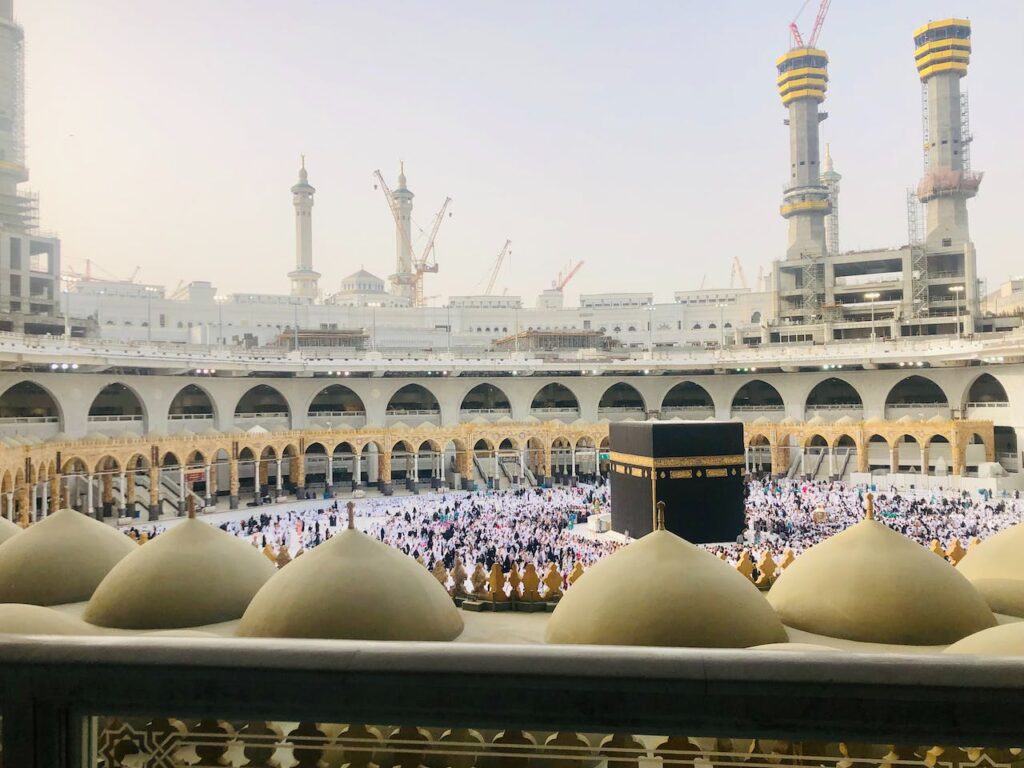The act of performing Hajj or Umrah is a significant milestone for Muslims around the world. It is a journey of devotion and spiritual rejuvenation. One of the fundamental aspects of these sacred pilgrimages is the recitation of specific verses and supplications. Among them is the Ayat Takbiratul Ihram, which holds great importance in the rituals of Hajj and Umrah. In this article, we will explore the significance of Ayat Takbiratul Ihram and delve into what to say before and during Ihram, as well as some important du’as associated with these acts of worship.
Ayat Takbiratul Ihram
Ayat Takbiratul Ihram refers to the verse recited when entering into the state of Ihram, the sacred state of pilgrimage. This verse is from the Holy Quran and serves as a proclamation of intention and devotion. The Ayat Takbiratul Ihram is as follows:
“Allahu Akbar, Allahu Akbar, Allahu Akbar, La ilaha illallah, Allahu Akbar, Allahu Akbar, wa lillahil-hamd.”
“”الله أكبر، الله أكبر، الله أكبر، لا إله إلا الله، الله أكبر، الله أكبر، ولله الحمد.”
Translation: “Allah is the greatest, Allah is the greatest, Allah is the greatest. There is no deity worthy of worship except Allah. Allah is the greatest, Allah is the greatest, and to Allah belongs all praise.”
This recitation marks the beginning of the sacred journey and sets the pilgrim’s mind and heart in a state of complete submission to Allah.
What to Say Before Ihram
Before entering into the state of Ihram, it is recommended to engage in a series of supplications and remembrances to seek blessings and forgiveness. Some of the recommended phrases to say before Ihram include:
- Istighfar (Seeking forgiveness): Seeking forgiveness from Allah for any shortcomings and sins committed.
- Tawbah (Repentance): Expressing sincere repentance to Allah and seeking His mercy and forgiveness.
- Salawat upon the Prophet Muhammad (pbuh): Sending blessings and prayers upon the final messenger of Allah.
- Making personal Du’as: Engaging in personal supplications, asking for guidance, strength, and blessings throughout the pilgrimage journey.
What to Say During Ihram
Once in the state of Ihram, there are specific phrases and supplications that pilgrims should engage in during their pilgrimage. These include:
- Firstly, Talbiyah:
The Talbiyah is a sacred invocation recited repeatedly throughout the pilgrimage. It is a declaration of devotion and surrender to Allah. The Talbiyah is as follows:
“Labbayk Allahumma labbayk, labbayka la sharika laka labbayk. Innal-hamda wan-ni’mata laka wal-mulk, la sharika lak.”
” لبيك اللهم لبيك، لبيك لا شريك لك لبيك. إن الحمد والنعمة لك والملك، لا شريك لك.”
Translation: “Here I am, O Allah, here I am. Here I am, there is no partner for You, here I am. Verily all praise, blessings, and dominion are Yours alone. You have no partner.”
- Secondly, Istighfar and Tawbah:
Continuing to seek forgiveness and repentance throughout the pilgrimage journey, acknowledging one’s shortcomings, and striving for purification.
- Moreover, Supplications for guidance and blessings:
Making Du’as for oneself, loved ones, the Muslim Ummah, and the world at large. Asking for strength, patience, and acceptance of the pilgrimage.
Du’as for Ihram and Umrah:
During the pilgrimage, there are specific Du’as that pilgrims can recite to seek blessings and guidance. Some of these include:
- Firstly, Du’a for acceptance of Hajj and Umrah:
“Allahumma taqabbal minni haadhal Hajj (or Umrah), wa ‘amalahu, wa tawbahahu, wa taqabbalhu minni kama takabbaltahu min ‘abdika Dawooda ‘alayhis-salam.”
“اللهم تقبل مني هذا الحج (أو العمرة) وتقبل عملي كله وتوبتي، وتقبله مني كما قبلته من عبدك داود عليه السلام
Translation: “O Allah, accept this Hajj (or Umrah) from me, and accept all my deeds and repentance. Accept it from me as You accepted it from Your servant Dawood (David), peace be upon him.”
- Secondly, Du’a for forgiveness:
“Allahum-maghfir li dhunubi waftah li abwaba rahmatik.”
“اللهم اغفر لي ذنوبي وفتح لي أبواب رحمتك”
Translation: “O Allah, forgive my sins and open the doors of Your mercy for me.”
- Moreover, Du’a for a blessed journey:
“Allahumma inni as’aluka fi safarina hadha al-birra wat-taqwa, wa minal-‘amali ma tarda.”
“اللهم إني أسألك في هذا السفر البر والتقوى، والعمل الذي ترضاه”
Translation: “O Allah, I ask You for righteousness and piety during this journey, and for deeds that are pleasing to You.”
Note that: These are examples and suggestions. You can pray for whatever you want
Conclusion
In conclusion, Reciting the Ayat Takbiratul Ihram and engaging in the recommended supplications and Du’as are integral parts of the pilgrimage experience. These acts of worship help establish a deep connection with Allah and enhance the spiritual significance ofthe pilgrimage journey. The Ayat Takbiratul Ihram serves as a proclamation of devotion and submission, while the supplications before and during Ihram allow pilgrims to seek forgiveness, guidance, and blessings.






